-
 Bitcoin
Bitcoin $117500
2.15% -
 Ethereum
Ethereum $3911
6.19% -
 XRP
XRP $3.316
10.79% -
 Tether USDt
Tether USDt $1.000
0.01% -
 BNB
BNB $787.2
2.24% -
 Solana
Solana $175.2
4.15% -
 USDC
USDC $0.9999
0.00% -
 Dogecoin
Dogecoin $0.2225
8.40% -
 TRON
TRON $0.3383
0.28% -
 Cardano
Cardano $0.7868
6.02% -
 Stellar
Stellar $0.4382
9.34% -
 Hyperliquid
Hyperliquid $40.92
7.56% -
 Sui
Sui $3.764
7.63% -
 Chainlink
Chainlink $18.48
10.66% -
 Bitcoin Cash
Bitcoin Cash $582.1
1.88% -
 Hedera
Hedera $0.2601
6.30% -
 Avalanche
Avalanche $23.33
4.94% -
 Ethena USDe
Ethena USDe $1.001
0.02% -
 Litecoin
Litecoin $122.3
2.04% -
 UNUS SED LEO
UNUS SED LEO $8.969
-0.27% -
 Toncoin
Toncoin $3.339
0.86% -
 Shiba Inu
Shiba Inu $0.00001287
4.30% -
 Uniswap
Uniswap $10.43
7.38% -
 Polkadot
Polkadot $3.861
5.08% -
 Dai
Dai $1.000
0.02% -
 Bitget Token
Bitget Token $4.513
3.41% -
 Monero
Monero $267.7
-6.18% -
 Cronos
Cronos $0.1499
4.14% -
 Pepe
Pepe $0.00001110
5.15% -
 Aave
Aave $284.9
8.28%
What is DAO? How does it change the traditional organizational model?
DAOs operate on blockchain, using smart contracts for transparent, democratic governance; token holders vote on decisions, managing funds from a communal treasury.
Mar 29, 2025 at 06:00 pm
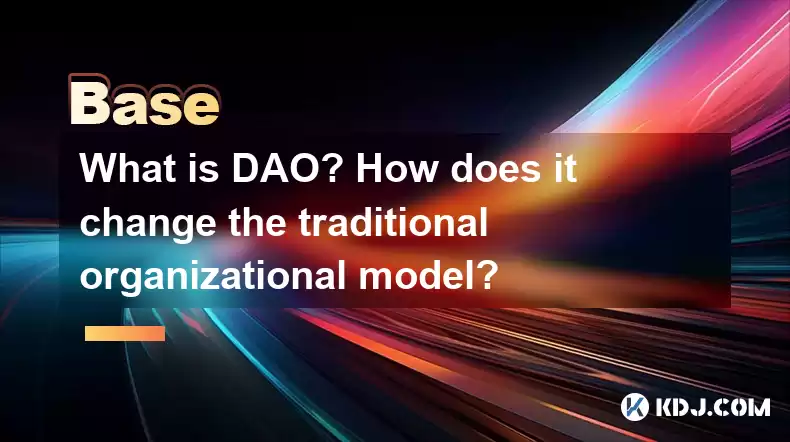
Understanding Decentralized Autonomous Organizations (DAOs)
A Decentralized Autonomous Organization (DAO) is a community-led entity without a central authority. It operates on a transparent, immutable blockchain, governed by pre-programmed rules encoded as smart contracts. Members participate and make decisions through token voting, fostering a democratic and transparent structure unlike traditional hierarchical organizations. The code dictates the organization's actions, removing the need for human intervention in routine processes. This autonomy is a core principle of DAOs.
How DAOs Differ from Traditional Organizations
Traditional organizations rely on centralized leadership and hierarchical structures. Decisions are made by a select few, often leading to bottlenecks and inefficiencies. Transparency is often limited, and accountability can be challenging. DAOs, in contrast, offer a radically different model. Decision-making is distributed among token holders, promoting inclusivity and agility. The rules are publicly visible and auditable on the blockchain, ensuring transparency and accountability.
The Mechanics of a DAO
DAOs function through smart contracts, self-executing contracts with the terms of the agreement directly written into code. These contracts automate processes and enforce rules, eliminating the need for intermediaries. Token holders vote on proposals using their tokens, with the outcome directly impacting the DAO's actions. This process is often governed by a quorum, a minimum percentage of tokens needed to approve a proposal.
DAO Governance and Decision-Making
The governance model of a DAO is crucial to its success. Different DAOs employ various mechanisms, such as quadratic voting, liquid democracy, or delegated governance. Quadratic voting gives more weight to smaller token holders, preventing large holders from dominating decisions. Liquid democracy allows token holders to delegate their voting power to others they trust. Delegated governance involves electing representatives to make decisions on behalf of the community. The choice of governance model significantly impacts the DAO's efficiency and fairness.
DAO Funding and Treasury Management
DAOs typically have a treasury, a pool of funds used to finance projects and operations. This treasury is usually managed through smart contracts, ensuring transparency and preventing unauthorized access. Funding can come from various sources, including initial coin offerings (ICOs), donations, or revenue generated by the DAO's activities. The management of the treasury is crucial and is often subject to community voting to ensure responsible spending.
The Advantages of DAOs
- Transparency: All transactions and decisions are recorded on the blockchain, making the DAO's activities fully auditable.
- Security: Smart contracts ensure that the DAO's rules are enforced automatically and securely.
- Efficiency: Automation reduces the need for intermediaries and streamlines decision-making processes.
- Inclusivity: Token holders have a direct say in the DAO's governance, promoting a more democratic and participatory environment.
- Resilience: The decentralized nature of DAOs makes them less vulnerable to single points of failure.
The Challenges of DAOs
- Security Risks: Smart contract vulnerabilities can be exploited by malicious actors, leading to significant financial losses.
- Governance Challenges: Establishing effective governance mechanisms can be complex and requires careful consideration.
- Scalability Issues: Some DAOs struggle to handle a large number of members and transactions efficiently.
- Regulatory Uncertainty: The legal status of DAOs is still evolving, creating uncertainty for participants.
- Complexity: Understanding and participating in DAO governance can be challenging for less technically proficient individuals.
How DAOs Change the Traditional Organizational Model
DAOs challenge the traditional top-down organizational structure by distributing power and decision-making among its members. This shift fosters greater transparency, accountability, and efficiency. Traditional hierarchies are replaced by a more collaborative and democratic model, potentially leading to more innovative and adaptable organizations. However, the challenges related to security, governance, and scalability must be addressed for DAOs to reach their full potential.
Real-World Applications of DAOs
DAOs are finding applications in various sectors, including finance, gaming, and social impact projects. They are used to create decentralized lending platforms, manage investment funds, and coordinate community-driven initiatives. The potential applications are vast, and the technology continues to evolve, paving the way for even more innovative uses.
Frequently Asked Questions
Q: What are the risks associated with investing in DAOs?
A: Investing in DAOs carries significant risks, including smart contract vulnerabilities, governance failures, and market volatility. Thorough research and due diligence are crucial before investing.
Q: How can I participate in a DAO?
A: Participation typically involves acquiring the DAO's governance token. The specific process varies depending on the DAO. Some DAOs may require a contribution of funds or other resources.
Q: Are DAOs regulated?
A: The regulatory landscape for DAOs is still evolving. Regulations vary across jurisdictions and are subject to change. It's crucial to understand the applicable regulations before participating in a DAO.
Q: What is the future of DAOs?
A: The future of DAOs is uncertain but holds significant potential. Technological advancements and regulatory clarity could lead to widespread adoption. However, challenges related to scalability, security, and governance need to be addressed.
Q: How do DAOs differ from traditional companies?
A: DAOs operate on a decentralized, transparent blockchain, using smart contracts to automate processes and govern operations. Traditional companies have centralized leadership and hierarchical structures, often lacking the same level of transparency and automation.
Disclaimer:info@kdj.com
The information provided is not trading advice. kdj.com does not assume any responsibility for any investments made based on the information provided in this article. Cryptocurrencies are highly volatile and it is highly recommended that you invest with caution after thorough research!
If you believe that the content used on this website infringes your copyright, please contact us immediately (info@kdj.com) and we will delete it promptly.
- Tron's Sell-Off Spurs Altcoin Shift: What's Next for TRX?
- 2025-08-08 08:30:12
- RUVI Presale: Is the Growth Potential Real?
- 2025-08-08 09:10:12
- Sleep Token's US Takeover: Thornhill Rides the 'Even In Arcadia' Wave
- 2025-08-08 08:30:12
- FTT Token's Wild Ride: Creditor Repayments vs. Market Drop - A New Yorker's Take
- 2025-08-08 07:10:12
- Floki Crypto Price Prediction: Riding the Robinhood Rocket or Just a Meme?
- 2025-08-08 07:15:12
- EigenLayer, Restaking, and Ethereum: Navigating the Hype and the Hazards
- 2025-08-08 06:30:12
Related knowledge
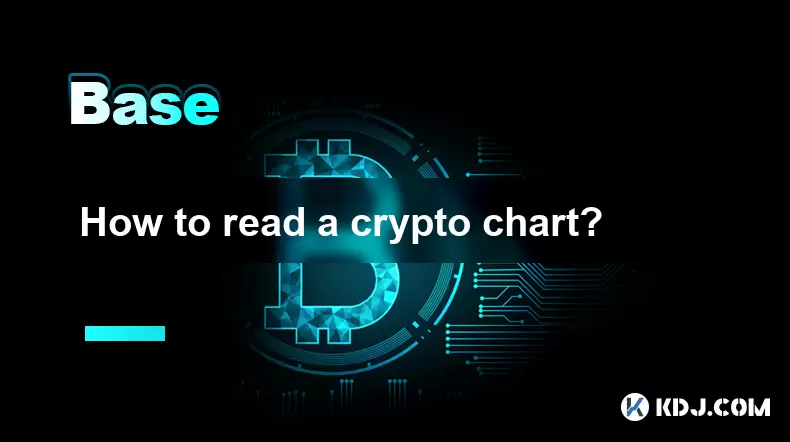
How to read a crypto chart?
Aug 08,2025 at 10:35am
Understanding the Basics of a Crypto ChartA crypto chart is a visual representation of the price movements of a cryptocurrency over time. These charts...
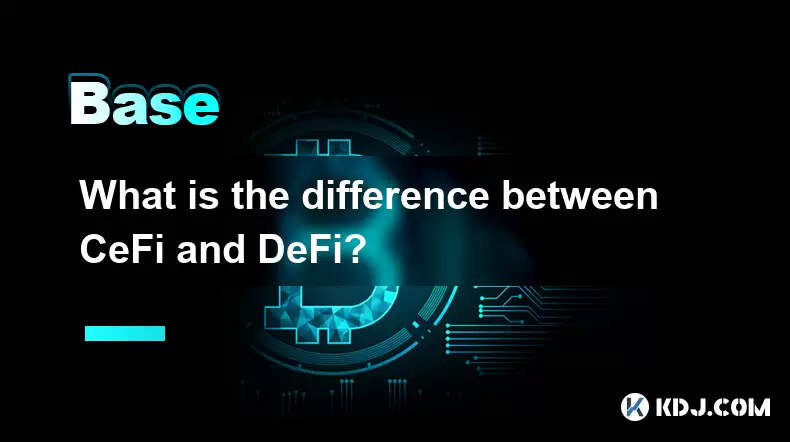
What is the difference between CeFi and DeFi?
Jul 22,2025 at 12:28am
Understanding CeFi and DeFiIn the world of cryptocurrency, CeFi (Centralized Finance) and DeFi (Decentralized Finance) represent two distinct financia...
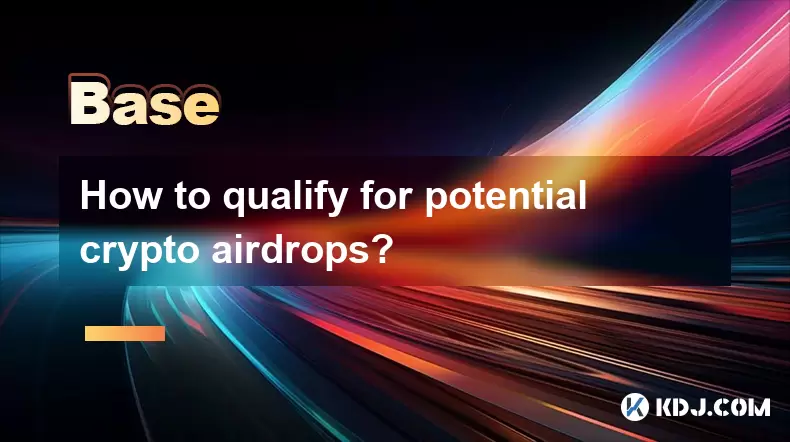
How to qualify for potential crypto airdrops?
Jul 23,2025 at 06:49am
Understanding What Crypto Airdrops AreCrypto airdrops refer to the distribution of free tokens or coins to a large number of wallet addresses, often u...
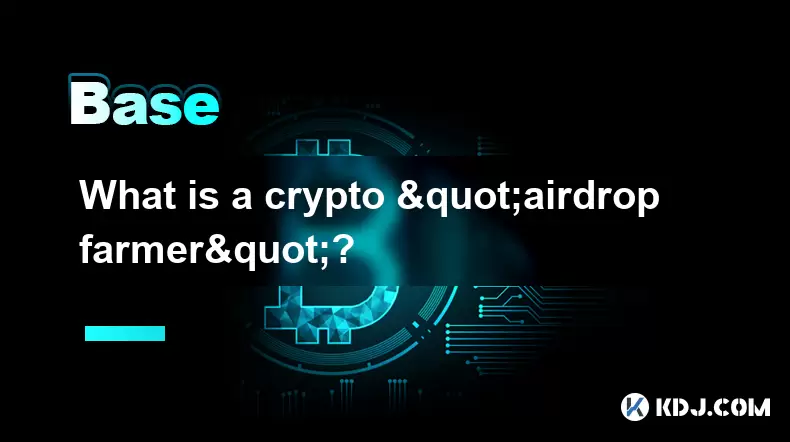
What is a crypto "airdrop farmer"?
Jul 24,2025 at 10:22pm
Understanding the Role of a Crypto 'Airdrop Farmer'A crypto 'airdrop farmer' refers to an individual who actively participates in cryptocurrency airdr...
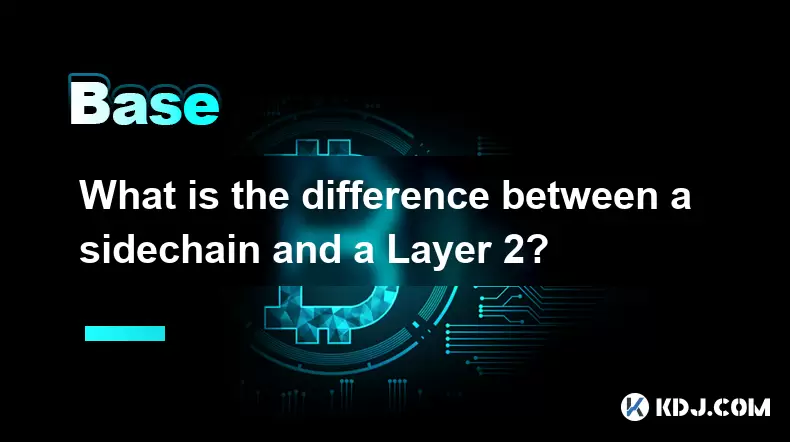
What is the difference between a sidechain and a Layer 2?
Jul 20,2025 at 11:35pm
Understanding the Concept of SidechainsA sidechain is a separate blockchain that runs parallel to the main blockchain, typically the mainnet of a cryp...
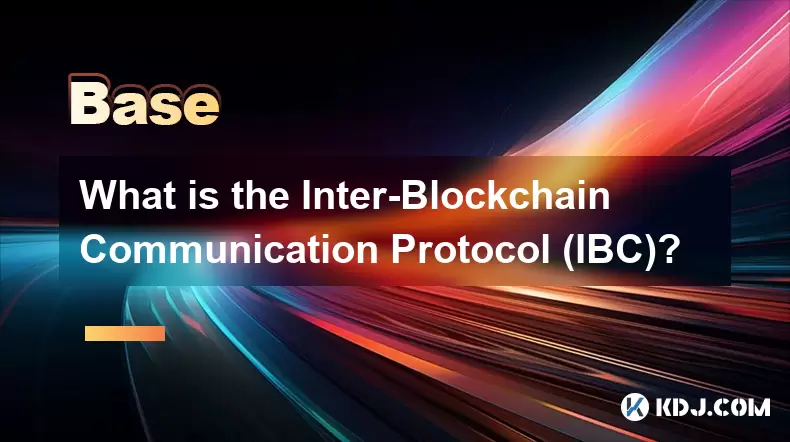
What is the Inter-Blockchain Communication Protocol (IBC)?
Jul 19,2025 at 10:43am
Understanding the Inter-Blockchain Communication Protocol (IBC)The Inter-Blockchain Communication Protocol (IBC) is a cross-chain communication protoc...

How to read a crypto chart?
Aug 08,2025 at 10:35am
Understanding the Basics of a Crypto ChartA crypto chart is a visual representation of the price movements of a cryptocurrency over time. These charts...

What is the difference between CeFi and DeFi?
Jul 22,2025 at 12:28am
Understanding CeFi and DeFiIn the world of cryptocurrency, CeFi (Centralized Finance) and DeFi (Decentralized Finance) represent two distinct financia...

How to qualify for potential crypto airdrops?
Jul 23,2025 at 06:49am
Understanding What Crypto Airdrops AreCrypto airdrops refer to the distribution of free tokens or coins to a large number of wallet addresses, often u...

What is a crypto "airdrop farmer"?
Jul 24,2025 at 10:22pm
Understanding the Role of a Crypto 'Airdrop Farmer'A crypto 'airdrop farmer' refers to an individual who actively participates in cryptocurrency airdr...

What is the difference between a sidechain and a Layer 2?
Jul 20,2025 at 11:35pm
Understanding the Concept of SidechainsA sidechain is a separate blockchain that runs parallel to the main blockchain, typically the mainnet of a cryp...

What is the Inter-Blockchain Communication Protocol (IBC)?
Jul 19,2025 at 10:43am
Understanding the Inter-Blockchain Communication Protocol (IBC)The Inter-Blockchain Communication Protocol (IBC) is a cross-chain communication protoc...
See all articles

























































































